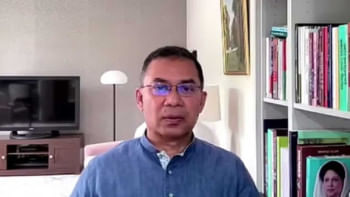No deal on humanitarian channel yet

Bangladesh will not engage in any proxy war, as suggested by a news portal of a neighbouring country, National Security Adviser Khalilur Rahman said yesterday.
The news portal falsely claimed that Bangladesh and the US were preparing for a proxy war in the Rakhine state of Myanmar, he added.
"If we were waging a proxy war on behalf of the US, China would be the first to be affected. Why isn't China protesting? Why is the disinformation campaign coming from elsewhere?"
He went on to say that China itself has supported Bangladesh in engaging with the Myanmar government and other stakeholders.
Khalilur, also the chief adviser's high representative for the Rohingya issue, made the remarks at a seminar titled "Repatriation of Rohingyas in Bangladesh: Strategic Implications on Regional Security and Ways Ahead".
The event was hosted jointly by the Armed Forces Division (AFD) and Bangladesh University of Professionals at BUP.
Khalilur said Bangladesh respects Myanmar's territorial integrity and is not supporting any separatist agenda. "We made it very clear to Myanmar that we do not support the dismemberment of the country. We respect its sovereignty."
Recently, various political parties have expressed concerns over the humanitarian channel to Rakhine after Foreign Adviser Touhid Hossain last week told media that the government agrees in principle to provide "humanitarian passage" to Rakhine, but with certain conditions.
He said stability in Rakhine could help Rohingya repatriation, but foreign policy analysts said a guarantee of secure Rohingya repatriation must be the precondition for any such move. Some even expressed concerns over the possible intervention of foreign powers in the region in case any such humanitarian corridor is established.
Khalilur said that Bangladesh has not discussed anything about the "humanitarian corridor", nor has there been any agreement with any parties, and added that the very phrase "corridor" carries specific implications.
"The UN Secretary-General, António Guterres, previously used the term 'humanitarian channel', which is completely different from a humanitarian corridor."
Earlier, Khalilur told The Daily Star that a "humanitarian corridor" may mean that people can travel using it. He also said Bangladesh was in contact with the Myanmar government directly and with the Arakan Army via the UN.
While noting that the current pause in fighting in Rakhine, if sustained, could pave the way for peace and repatriation, he warned, however, that peace would not be sustainable unless Rohingyas were included in the evolving administration in Rakhine.
"Bangladesh, through the UN, has conveyed its demand for the inclusion of Rohingyas in the leadership positions of Rakhine and is awaiting a response."
Also speaking at the event, Foreign Affairs Adviser Touhid Hossain said the prospect of Rohingya repatriation remains grim due to Myanmar's ongoing civil war, fragmented authority, and the continued absence of security and citizenship guarantees.
There are some 1.4 million Rohingyas sheltered in Bangladesh, and the repeated repatriation attempts have failed since 2017.
"We cannot abandon diplomacy, but we must stop hoping that bilateral talks alone will succeed."
He stressed that any lasting resolution must involve all three entities – the Myanmar government, the National Unity Government and the Arakan Army.
Addressing the seminar as the keynote speaker, Professor Shahab Enam Khan of International Relations at Jahangirnagar University said the protracted Rohingya crisis has become a major national security concern for Bangladesh, with ramifications far beyond humanitarian aid.
"The Rohingya issue is no longer confined to humanitarian assistance—it is now deeply entwined with our national security architecture," he said.
Prof Shahab cautioned that while Bangladesh has made notable progress in counter-terrorism, these achievements could be undermined if root causes such as inequality, marginalisation, and protracted displacement remain unaddressed.
Speaking as the special guest, AFD Principal Staff Officer Lt Gen SM Kamrul Hassan stressed that the Rohingya crisis is no longer a bilateral issue but a tangible threat to regional stability, contributing to border stress, instability within refugee camps, and diplomatic tensions with neighbouring countries.
Despite official confirmation from Myanmar authorities that 180,000 Rohingyas are eligible to return, the ground reality tells a different story, he said, pointing to the absence of Myanmar government officials in border areas, and the Arakan Army's ambiguous stance on the Rohingyas raises serious concerns.
He called for strong regional cooperation and sustained international support to ensure a safe, dignified, and sustainable repatriation of the Rohingyas.

 For all latest news, follow The Daily Star's Google News channel.
For all latest news, follow The Daily Star's Google News channel. 







Comments